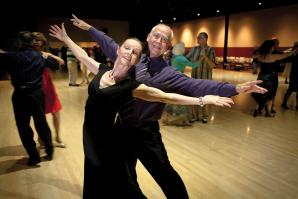When aging loved ones begin showing signs that they may no longer be safe behind the wheel, there are some options for concerned family members. The Department of Motor Vehicles provides driving tests and safety courses designed specifically for seniors, and adaptive equipment and therapy is also available to make cars and driving easier.
The DMV’s Supplementary Driving Performance Evaluation for seniors helps assess their ability to drive. According to the DMV website, the test provides “the opportunity to demonstrate that you can compensate for any limitations, including physical or mental conditions, which may affect your ability to drive safely.”
Seniors must take this test following a failure of the minimum 20/40 eye test, displaying unsafe behavior from physical or mental conditions while renewing a license, or a referral from a driving safety officer, law enforcement, a physician or a concerned family member or friend. The test includes performing turns, backing up, navigating controlled and uncontrolled intersections and sometimes going on the freeway. Seniors unable or unwilling to perform sections of the test will have restrictions put on their licenses.
Seniors can prepare for the driving test — and possibly even lower their insurance rates — by taking a DMV-approved “mature driver improvement course.” These courses cover recent changes to driving laws, defensive driving techniques, safe ways to use new car technology and how medications and distractions affect driving. The courses are available in a classroom or online, however all courses require at least 6 hours of in-class instruction.
Another option is a private, behind-the-wheel “refresher” course. Private driving schools teach these courses for adults, although not every driving school offers them.
For an individual assessment, occupational therapists that specialize in driver rehabilitation can help seniors evaluate their ability to drive and recommend plans to reduce driving risks caused by physical or mental conditions. These specialists also can help with selecting and using adaptive equipment for cars that make driving easier. Some forms of adaptive equipment require special training to operate, while others can be used without any special training.
To find a DMV-approved mature driver course, visit dmv.ca.gov.
To find a driver rehabilitation specialist in your area, visit the The American Occupational Therapy Association website at aota.org.
To find more information about adaptive equipment, visit AAA at aaa.com or AARP at aarp.com.
Recommended For You

Better With Age
Emerging trends offer senior living with style
Retirement communities are facing the challenges that come with catering to seniors in the 21st century. These consumers — and there are a lot of them — are demanding greater access to technology, life-long learning programs and attention to overall wellness.

The New Old Worker
Seniors enjoy the mental benefits of staying on the job
Americans once looked at early retirement as reward for decades of hard work, a chance to relax and the opportunity to do more of what they enjoyed — including doing absolutely nothing.


